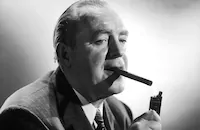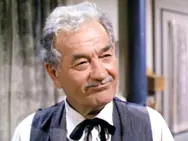The Fireball
Brief Synopsis
Cast & Crew
Tay Garnett
Mickey Rooney
Pat O'brien
Beverly Tyler
James Brown
Ralph Dumke
Film Details
Technical Specs

Synopsis
At the St. Luke's Home for Boys, Father O'Hara realizes that orphan Johnny Casar's deliquency is due to the fact that the other boys tease him for being too short and unathletic. When the priest confronts him, Johnny promptly runs away from the home. He soon finds a pair of roller skates and is befriended by Bruno Crystal, who allows him to wash dishes at his café. The next morning, policemen track Johnny from the parking lot where he spent the night to the café. They report his whereabouts to Father O'Hara, who tells Bruno that Johnny's running away took a kind of courage the boy previously did not have. After the priest asks Bruno to keep an eye on Johnny, Bruno offers him steady work and a place to stay. Later, Johnny visits the local skating rink for free lessons. There, he meets instructor Mack Miller, who is a champion speed skater and a bully. Mary Reeves, another champion and instructor, rescues Johnny from Miller's teasing and encourages him to participate in the races that are being held on the flat rink floor. Enthusiastically, Johnny works out at the rink every morning before reporting to the café. One night, as Father O'Hara and Bruno watch him race, Johnny allows Miller to push him around on the track and win. The following week, however, Johnny yanks Miller out of the race and slugs him, losing the match but pleasing everyone with his fighting spirit. Mary then introduces Johnny to Jeff Davis, the owner-manager of the local roller speedway team, the Bears, and tells Johnny that she will soon be leaving on an eight-month tour of the banked track circuit. Johnny attends the first local matches and heckles Miller for three consecutive nights. Miller asks Davis to have Johnny ejected, but the crowd, charmed by the boy's exuberance, insists that he stay. A half-time interview conducted by the announcer televising the match intensifies the rivalry between Johnny and Miller. Over the next few days, Jeff is flooded with phone calls and letters demanding a race between the two, and a grudge match is arranged. As Johnny has never skated on a banked track, however, Miller quickly eliminates him by pushing him over the track rail. Thrilled with the sold-out crowd, Jeff stages rematches for each night, and after intensive training with Mary, Johnny finally knocks Miller off the track. Jeff then invites Johnny to join the Bears, who begin a cross-country tour. Johnny's rough playing wins them the championship, and he is named Athlete of the Year. Fame quickly swells his head, however, and Jeff tells him that he is making a "chump" of himself carousing around and not training. At a party, Johnny, whose teammates now hate him, makes a fool of himself. Although Mary, who secretly loves him, defends him, she then storms out when he makes an offhanded pass at her. At the international championships, Johnny and Miller are skating together when, in his zeal to win at any cost, Johnny deliberately knocks Miller down, causing a dangerous pile-up of all the other skaters. The fans, Father O'Hara and Jeff are disgusted with his lack of sportsmanship, but become concerned when he later collapses. Johnny is diagnosed with polio and begins a long program of physical therapy. Months later, discouraged with his lack of progress, he contemplates suicide, but visits from Father O'Hara and Mary inspire him to recover. Some time later, when Father O'Hara brings him to a match in a wheelchair, the team and the crowd give him an ovation. Eventually, after years of therapy, Johnny visits the rink one night and tries to skate again in the darkened arena. Although he at first falls, Jeff, Father O'Hara and Mary are there to cheer him on. Soon, Jeff reinstates him on the team for that year's international matches. The crowd's adulation immediately transforms Johnny into the same cocky player he had been before his fall, and when Father O'Hara asks him to help a young skater make his mark, Johnny spurns him. During the match, however, the priest's earlier admonition that he should return some of the kindness shown to him during his illness sinks in, and he helps the rookie to score, to the delight of both Father O'Hara and Mary.

Director

Tay Garnett
Cast

Mickey Rooney

Pat O'brien

Beverly Tyler
James Brown
Ralph Dumke

Milburn Stone
Kenneth Begley

Marilyn Monroe
Sam Flint

Glenn Corbett
John Hedloe
Crew
David Chudnow
Sid Cutner
Agnes Flanagan
William Fox
Bert E. Friedlob
Tay Garnett
Charles Kerr
Horace Mccoy
Horace Mccoy
Van Nest Polglase
Joseph Popkin
Leo Shuken
Richard Staub
Frank Sullivan
Edward Voight
Lester White
Victor Young

Film Details
Technical Specs

Quotes
Trivia
Notes
The film's working titles were Dark Challenge and The Challenge. Orchestrator Sid Cutner's name is misspelled in the opening credits. Fireball was the first film made by Thor Productions, Inc., which was owned by Bert Friedlob and Tay Garnett. According to Garnett's autobiography, producer Friedlob owned the International Roller Speedway and wanted to make a film featuring it. Garnett's book implies that the film's skating sequences were shot during a tour of the Roller Speedway to Guam and Manila but a Hollywood Reporter news item of November 28, 1949 reported that production was starting that day in San Diego. According to documents in the Twentieth Century-Fox Records of the Legal Department at the UCLA Arts-Special Collections Library, a building in Balboa Park, San Diego May have been used for the skating sequences through mid-December 1949. Other interior sequences were shot at Motion Picture Center Studios in January 1950. In the Variety review, actor Kenneth Begley is listed as Bert Begley. Actor Glenn Corbett made his motion picture debut in the film.
The Roller Derby originated in the mid-1930s and consisted of separate teams of men and women attempting to pass each other, on a banked track, to win points. These roller skating "exhibitions" which, under different names and franchises, were characterized by staged fights and other sensationalized, fan-oriented antics, became a staple of early television programming and were popular into the 1970s.

Miscellaneous Notes
Released in United States Fall October 1950
Released in United States Fall October 1950











